小学六年级英语语法一般过去时态
- 格式:doc
- 大小:24.00 KB
- 文档页数:5
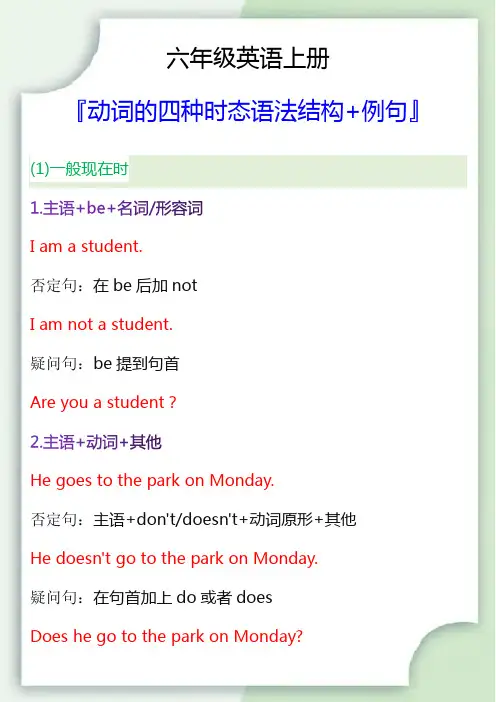
六年级英语上册『动词的四种时态语法结构+例句』(1)一般现在时I am a student.否定句:在be后加notI am not a student.疑问句:be提到句首Are you a student?He goes to the park on Monday.否定句:主语+don't/doesn't+动词原形+其他He doesn't go to the park on Monday.疑问句:在句首加上do或者doesDoes he go to the park on Monday?(2)一般过去时He went to the market.否定句:在动词前加didn't,动词恢复原形;在be后加not He didn't go to the market.疑问句:在句前加did,或将be提到句首Did he go to the market?(3)一般将来时She is going to ride a horse.否定句:在be后加notShe is not going to ride a horse.疑问句:将be提到句首Is she going to ride a horse?I will go to the library.否定句:在will后加not,或缩写为won't I will not go to the library.疑问句:将will提到句首Will you go to the library?(4)现在进行时They are reading English.否定句:在be后加notThey are not reading English.疑问句:将be提到句首Are they reading English?回答:Yes, they are./No, they aren't.。
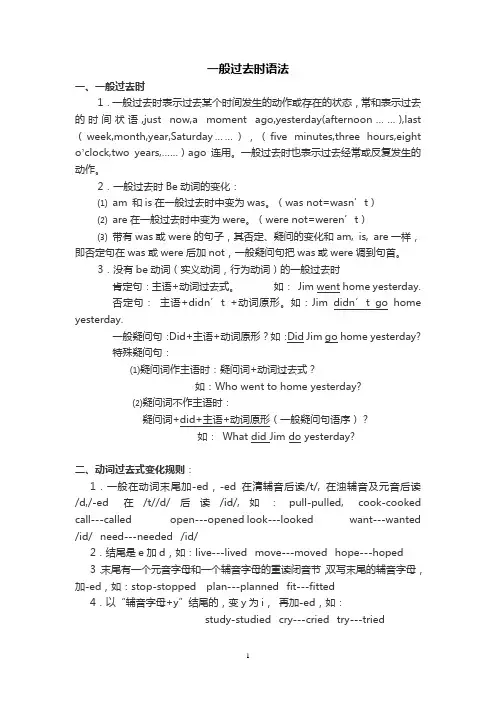
一般过去时语法一、一般过去时1.一般过去时表示过去某个时间发生的动作或存在的状态,常和表示过去的时间状语,just now,a moment ago,yesterday(afternoon……),last (week,month,year,Saturday……),(five minutes,three hours,eight o’clock,two years,……)ago连用。
一般过去时也表示过去经常或反复发生的动作。
2.一般过去时Be动词的变化:⑴ am 和is在一般过去时中变为was。
(was not=wasn’t)⑵ are在一般过去时中变为were。
(were not=weren’t)⑶带有was或were的句子,其否定、疑问的变化和am, is, are一样,即否定句在was或were后加not,一般疑问句把was或were调到句首。
3.没有be动词(实义动词,行为动词)的一般过去时肯定句:主语+动词过去式。
如: Jim went home yesterday.否定句:主语+didn’t +动词原形。
如:Jim didn’t go home yesterday.一般疑问句:Did+主语+动词原形?如:Did Jim go home yesterday?特殊疑问句:⑴疑问词作主语时:疑问词+动词过去式?如:Who went to home yesterday?⑵疑问词不作主语时:疑问词+did+主语+动词原形(一般疑问句语序)?如:What did Jim do yesterday?二、动词过去式变化规则:1.一般在动词末尾加-ed,-ed在清辅音后读/t/, 在浊辅音及元音后读/d,/-ed在/t//d/后读/id/,如:pull-pulled, cook-cooked call---called open---opened look---looked want---wanted /id/ need---needed /id/2.结尾是e加d,如:live---lived move---moved hope---hoped3.末尾有一个元音字母和一个辅音字母的重读闭音节,双写末尾的辅音字母,加-ed,如:stop-stopped plan---planned fit---fitted 4.以“辅音字母+y”结尾的,变y为i,再加-ed,如:study-studied cry---cried try---tried 以“元音字母+y”结尾的,直接加-ed,如:play-played enjoy---enjoyed5.不规则动词过去式:如am, is-was, are-were, do-did,has,have-had see-saw, say-said……等不规则动词的过去式的构成:1.把动词原形中的i改为a,变成过去式。
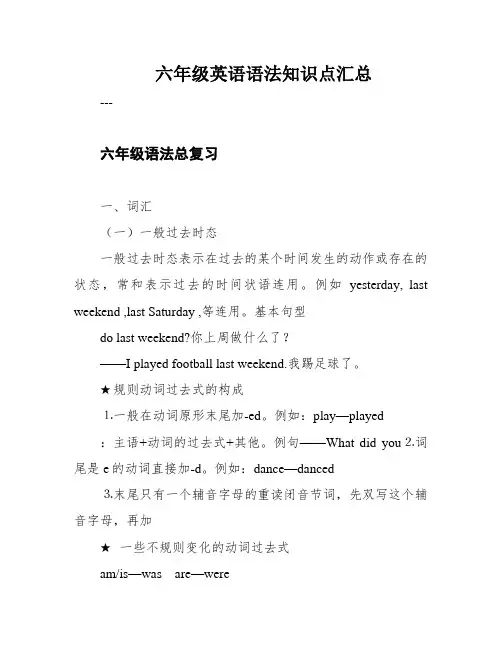
六年级英语语法知识点汇总---六年级语法总复习一、词汇(一)一般过去时态一般过去时态表示在过去的某个时间发生的动作或存在的状态,常和表示过去的时间状语连用。
例如yesterday, last weekend ,last Saturday ,等连用。
基本句型do last weekend?你上周做什么了?——I played football last weekend.我踢足球了。
★规则动词过去式的构成⒈一般在动词原形末尾加-ed。
例如:play—played:主语+动词的过去式+其他。
例句——What did you⒉词尾是e的动词直接加-d。
例如:dance—danced⒊末尾只有一个辅音字母的重读闭音节词,先双写这个辅音字母,再加★一些不规则变化的动词过去式am/is—was are—weresee—sawtake—tookread—read觉)—slept-ed。
例如stop(截止)--stopped⒋结尾是“子音字母+y”的动词,变“y”为“i”,再加-ed,例如:study--studiedgo—wentcome—cameswim—swam fly—flewbecome—becamedo—didget—gothave—haddraw—drewsay—saidhurt—hurtsleep(睡win—wontell—toldwill—wouldeat—ate take—tookcut(切)--cutsit(坐)—satthink—thoughtfind—foundmake—made drink—drankrun(跑)---ranwear—worebegin(入手下手)—beganbuy—boughtgive(给)—gave sing—sang(二)普通目前时态leave—left hear(听)--heart普通目前时态透露表现包孕目前工夫在内的一段工夫内经常发生的举措或存在的状况,透露表现习气性或客观存在的究竟和谬误。
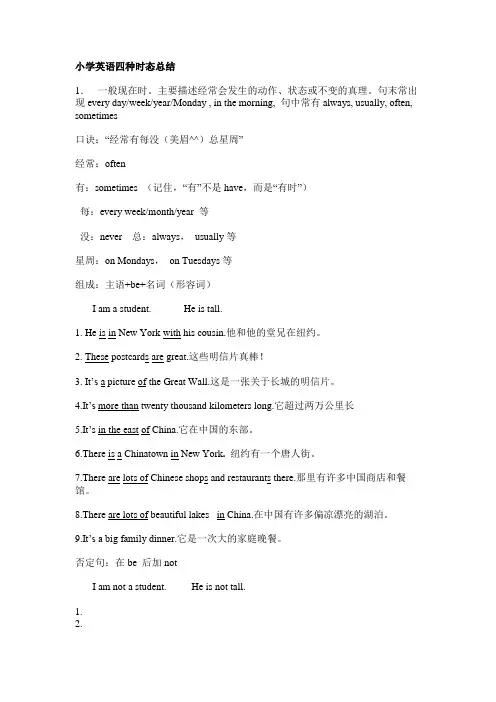
小学英语四种时态总结1.一般现在时。
主要描述经常会发生的动作、状态或不变的真理。
句末常出现every day/week/year/Monday , in the morning, 句中常有always, usually, often, sometimes口诀:“经常有每没(美眉^^)总星周”经常:often有:sometimes (记住,“有”不是have,而是“有时”)每:every week/month/year 等没:never 总:always,usually等星周:on Mondays,on Tuesdays等组成:主语+be+名词(形容词)I am a student. He is tall.1. He is in New York with his cousin.他和他的堂兄在纽约。
2. These postcards are great.这些明信片真棒!3. It’s a picture of the Great Wall.这是一张关于长城的明信片。
4.It’s more than twenty thousand kilometers long.它超过两万公里长5.It’s in the east of China.它在中国的东部。
6.There is a Chinatown in New York.纽约有一个唐人街。
7.There are lots of Chinese shops and restaurants there.那里有许多中国商店和餐馆。
8.There are lots of beautiful lakes in China.在中国有许多偏凉漂亮的湖泊。
9.It’s a big family dinner.它是一次大的家庭晚餐。
否定句:在be 后加notI am not a student. He is not tall.1.2.3.4.5.6.7.8.9.疑问句:be 动词提前到第一位。
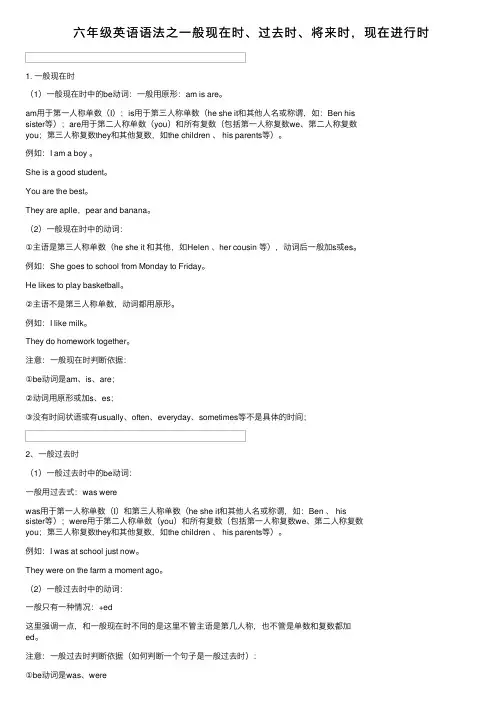
六年级英语语法之⼀般现在时、过去时、将来时,现在进⾏时1. ⼀般现在时(1)⼀般现在时中的be动词:⼀般⽤原形:am is are。
am⽤于第⼀⼈称单数(I);is⽤于第三⼈称单数(he she it和其他⼈名或称谓,如:Ben hissister等);are⽤于第⼆⼈称单数(you)和所有复数(包括第⼀⼈称复数we、第⼆⼈称复数you;第三⼈称复数they和其他复数,如the children 、 his parents等)。
例如:I am a boy 。
She is a good student。
You are the best。
They are aplle,pear and banana。
(2)⼀般现在时中的动词:①主语是第三⼈称单数(he she it 和其他,如Helen 、her cousin 等),动词后⼀般加s或es。
例如:She goes to school from Monday to Friday。
He likes to play basketball。
②主语不是第三⼈称单数,动词都⽤原形。
例如:I like milk。
They do homework together。
注意:⼀般现在时判断依据:①be动词是am、is、are;②动词⽤原形或加s、es;③没有时间状语或有usually、often、everyday、sometimes等不是具体的时间;2、⼀般过去时(1)⼀般过去时中的be动词:⼀般⽤过去式:was werewas⽤于第⼀⼈称单数(I)和第三⼈称单数(he she it和其他⼈名或称谓,如:Ben 、 hissister等);were⽤于第⼆⼈称单数(you)和所有复数(包括第⼀⼈称复数we、第⼆⼈称复数you;第三⼈称复数they和其他复数,如the children 、 his parents等)。
例如:I was at school just now。
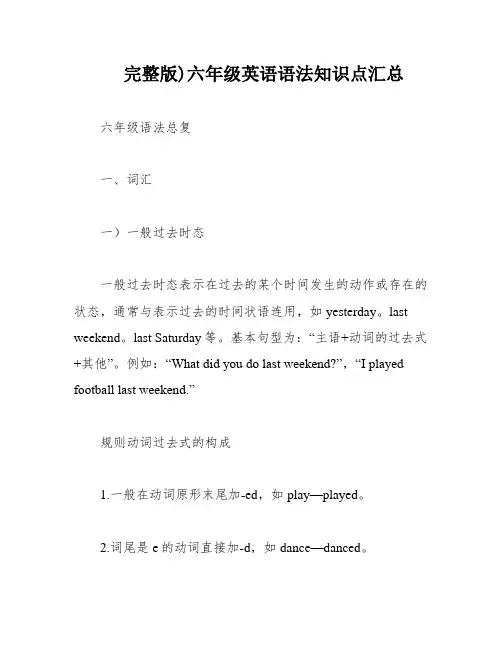
完整版)六年级英语语法知识点汇总六年级语法总复一、词汇一)一般过去时态一般过去时态表示在过去的某个时间发生的动作或存在的状态,通常与表示过去的时间状语连用,如yesterday。
last weekend。
last Saturday等。
基本句型为:“主语+动词的过去式+其他”。
例如:“What did you do last weekend?”,“I played football last weekend.”规则动词过去式的构成1.一般在动词原形末尾加-ed,如play—played。
2.词尾是e的动词直接加-d,如dance—danced。
3.末尾只有一个辅音字母的重读闭音节词,先双写这个辅音字母,再加-ed,(停止)ped。
4.结尾是“辅音字母+y”的动词,变“y”为“i”,再加-ed,如study--studied。
一些不规则变化的动词过去式am/is—was,are—were,see—saw,take—took,read—read,sleep(睡觉)—slept,go—went,come—came,swim—swam,fly—flew,e—became,do—did,get—got,have—had,draw—drew,say—said,hurt—hurt,win—won,tell—told,will—would,eat—ate,cut(切)--cut,sit(坐)—sat,think—thought,find—found,make—made,drink—drank,run(跑)—ran,wear—wore,begin(开始)—began,buy—bought,give(给)—gave,sing—sang。
二)一般现在时态一般现在时态表示包括现在时间在内的一段时间内经常发生的动作或存在的状态,表示惯性或客观存在的事实和真理,通常与often。
always。
usually。
sometimes。
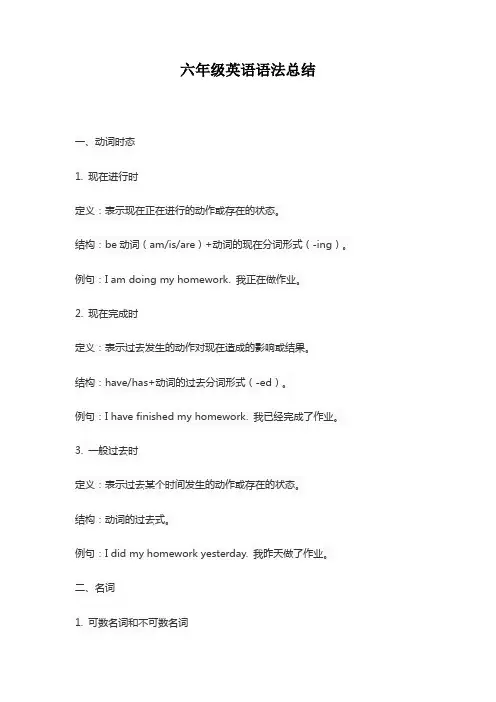
六年级英语语法总结一、动词时态1. 现在进行时定义:表示现在正在进行的动作或存在的状态。
结构:be动词(am/is/are)+动词的现在分词形式(-ing)。
例句:I am doing my homework. 我正在做作业。
2. 现在完成时定义:表示过去发生的动作对现在造成的影响或结果。
结构:have/has+动词的过去分词形式(-ed)。
例句:I have finished my homework. 我已经完成了作业。
3. 一般过去时定义:表示过去某个时间发生的动作或存在的状态。
结构:动词的过去式。
例句:I did my homework yesterday. 我昨天做了作业。
二、名词1. 可数名词和不可数名词可数名词:可以计数的名词,如book(书)、apple(苹果)。
不可数名词:无法计数的名词,如water(水)、milk(牛奶)。
2. 名词的复数形式大多数名词的复数形式是在词尾加上s或es,如books、apples。
三、代词1. 人称代词:表示人称的代词,如I(我)、you(你)、he(他)、she(她)。
2. 物主代词:表示所有关系的代词,如my(我的)、your(你的)、his(他的)、hers(她的)。
四、形容词和副词1. 形容词:用来描述名词或代词的性质或特征,如red(红色的)、big(大的)。
2. 副词:用来描述动词、形容词或其他副词的程度或方式,如slowly(慢慢地)、quickly(快速地)。
五、介词1. 表示时间的介词:如in(在...里)、on(在...上)、at(在...点)。
2. 表示位置的介词:如in(在...内)、on(在...上)、at(在...处)。
六、定冠词和不定冠词1. 定冠词:表示特指,如the(这个)、that(那个)。
2. 不定冠词:表示泛指,如a(一个)、an(一个)。
七、句式结构1. 陈述句:陈述一个事实或观点,如I am a student.(我是一个学生。
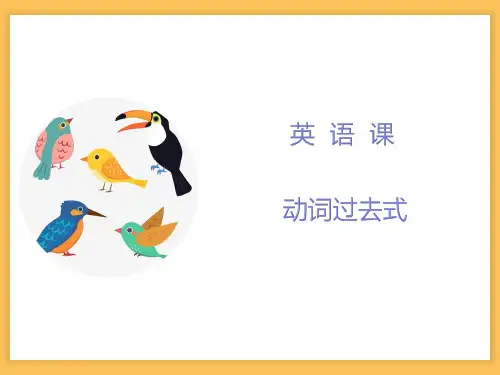
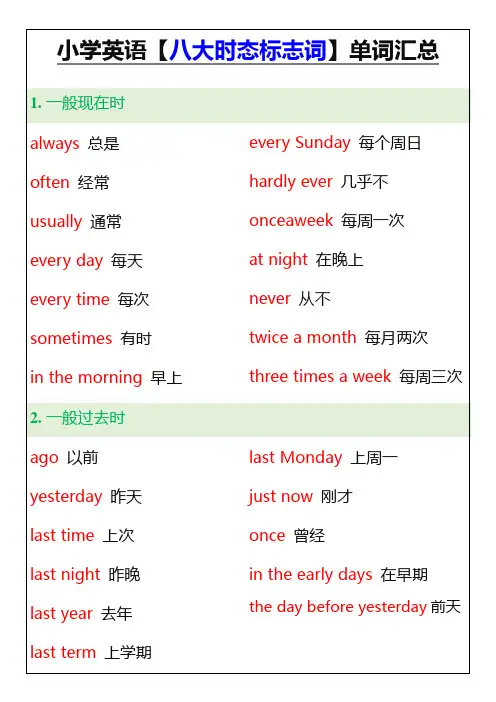
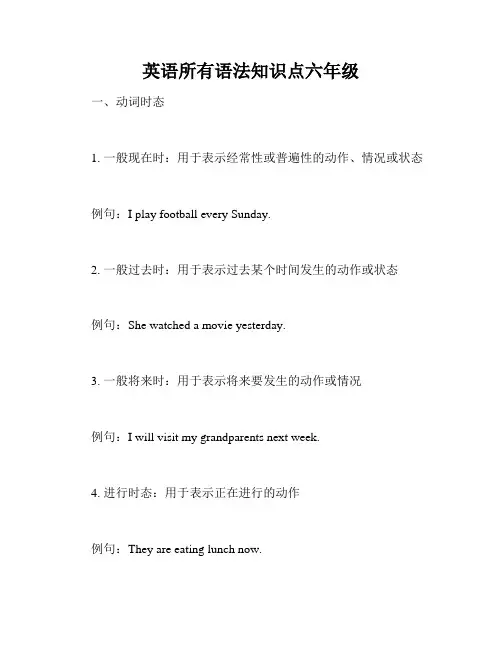
英语所有语法知识点六年级一、动词时态1. 一般现在时:用于表示经常性或普遍性的动作、情况或状态例句:I play football every Sunday.2. 一般过去时:用于表示过去某个时间发生的动作或状态例句:She watched a movie yesterday.3. 一般将来时:用于表示将来要发生的动作或情况例句:I will visit my grandparents next week.4. 进行时态:用于表示正在进行的动作例句:They are eating lunch now.5. 完成时态:用于表示已经完成的动作或状态例句:He has finished his homework.二、名词1. 可数名词与不可数名词例句:There are three apples on the table. (可数名词) I want some water. (不可数名词)2. 单数名词与复数名词例句:The dog is cute. (单数名词)The dogs are playing in the park. (复数名词)3. 名词所有格例句:Tom's book is on the table.三、形容词与副词1. 形容词用于修饰名词,表示名词的性质、特征或状态例句:She has a beautiful flower.2. 副词用于修饰动词、形容词或副词,表示方式、程度或时间等例句:He runs quickly.四、冠词1. 不定冠词(a/an)用于泛指单数可数名词前例句:I see an apple.2. 定冠词(the)用于特指或泛指某个人或物例句:The cat is on the table.五、代词1. 主格代词用于作主语例句:She is my friend.2. 宾格代词用于作宾语例句:He gave me a present.3. 物主代词表示所属关系例句:This is his book.六、介词1. 介词用于表示位置、时间、原因、方式等例句:He is in the park.2. 一些常见介词:in, on, at, with, for, to 等七、连词1. 并列连词用于连接同等重要的词、短语、句子等例句:I like apples and oranges.2. 从属连词用于引导从句例句:She is happy because she won the game.八、疑问词1. 疑问词用于构成疑问句例句:Where is the book?九、形容词比较级与最高级1. 形容词比较级用于表示两者之间的比较例句:She is taller than her sister.2. 形容词最高级用于表示三者或三者以上的比较例句:She is the tallest girl in the class.十、情态动词1. 情态动词用于表示能力、可能性、许可等例句:I can swim.十一、直接引语与间接引语1. 直接引语直接引述别人的原话例句:He said, "I am happy."2. 间接引语是对别人的话进行转述例句:He said he was happy.以上是六年级英语的所有语法知识点,掌握这些知识将会帮助你更好地理解和运用英语语法。
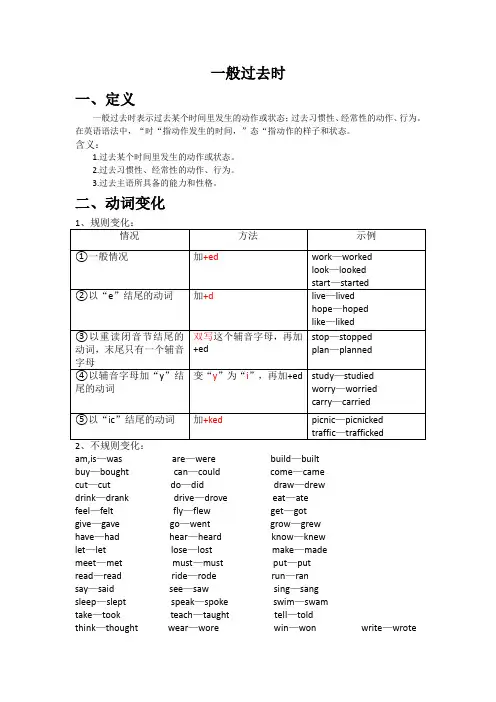
一般过去时一、定义一般过去时表示过去某个时间里发生的动作或状态;过去习惯性、经常性的动作、行为。
在英语语法中,“时“指动作发生的时间,”态“指动作的样子和状态。
含义:1.过去某个时间里发生的动作或状态。
2.过去习惯性、经常性的动作、行为。
3.过去主语所具备的能力和性格。
二、动词变化am,is—was are—were build—builtbuy—bought can—could come—camecut—cut do—did draw—drewdrink—drank drive—drove eat—atefeel—felt fly—flew get—gotgive—gave go—went grow—grewhave—had hear—heard know—knewlet—let lose—lost make—mademeet—met must—must put—putread—read ride—rode run—ransay—said see—saw sing—sangsleep—slept speak—spoke swim—swamtake—took teach—taught tell—toldthink—thought wear—wore win—won write—wrote三、句法结构当句子中出现“yesterday,last night,in1997,two days ago”等单词时,则要注意动词是否需要变过去式。
1、肯定形式主语+动词过去式+其它例句:She often came to help us in those days.I did my homework yesterday evening.2、否定形式主语+didn't +谓语动词原形+其它①was/were+not;例句:I wasn’t at home yesterday.②在行为动词前加didn't,同时还原行为动词例句:I didn't know you like coffee.3、一般疑问句①Did+主语+谓语动词原形+其它?例句:Did I do homework?②Was/Were+主语+表语?例句:Were you late yesterday?4、特殊疑问句①疑问词+ did+主语+动词原形+其它?例句:What did you do last weekend?②疑问词+was/were+主语+其它?例句:Where was he yesterday?When were you born?记忆口诀:一般过去时并不难,过去动作、状态记心间。
小学六年级英语一般过去式语法知识点2)Be动词在一般过去时中的变化:am和is在一般过去时中变为was。
am,is----wasare在一般过去时中变为were。
3)动词过去式变化规则:1.一般在动词末尾加-ed,如:point-pointed,shout-shouted2.以不发音的e结尾加-d,如:like-likedlive-lived4)过去式“-ed”的发音规则1)动词词尾为“t,d”时,发/ id /音,want →wanted(要)need →needed(需要)(2)动词词尾为清辅音时,发/ t /音。
help →helped(帮助)laugh →XXX(笑)look →looked(看)kiss →kissed(吻)wash →washed(洗)(3)动词词尾为t,d以外之浊辅音或元音时,发/ d /音。
call→called(叫)stay→stayed(停留)cry→cried(哭)1)一般过去时时间标志语long longago(很久以前)。
one day(有一天),yesterday(昨天),last night(昨晚)。
three days ago(三天前)。
2)Be动词在一般过去时中的变化:am和XXX在普通曩昔时中变为was。
am,is----wasare在普通曩昔时中变为were。
3)动词过去式变化规则:1.普通在动词末尾加-ed,如:point-pointed,shout-shouted2.以不发音的e结尾加-d,如:like-likedlive-lived4)曩昔式“-ed”的发音划定规矩1)动词词尾为“t,d”时,发/ id /音,want →wanted(要)need →needed(需求)(2)动词词尾为清子音时,发/ t /音。
help →helped(帮助)laugh →XXX(笑)look →looked(看)kiss →kissed(吻)wash →washed(洗)(3)动词词尾为t,d以外之浊子音或元音时,发/ d /音。
六年级英语时态知识点总结英语的时态是描述动作发生的时间和状态的一种语法现象。
在六年级的学习中,我们主要学习了以下几个时态:一般现在时、一般过去时、一般将来时、现在进行时、过去进行时以及将来进行时。
下面是对这些时态的详细总结:一、一般现在时一般现在时用来表示经常性或习惯性的动作,以及客观事实等。
1. 基本结构主语 + 动词原形(第三人称单数加-s)2. 句例- I like playing soccer with my friends.- She always brushes her teeth after meals.- The sun rises in the east.二、一般过去时一般过去时用来表示过去某个具体时间发生的动作或状态。
1. 基本结构主语 + 动词过去式2. 句例- Yesterday, I went to the zoo with my family.- We lived in a small village last year.- He finished his homework two hours ago.三、一般将来时一般将来时用来表示将来某个时间要发生的动作或存在的状态。
1. 基本结构主语 + will + 动词原形2. 句例- I will visit my grandparents this weekend.- They will have a party next month.- She will be a doctor when she grows up.四、现在进行时现在进行时用来表示现在正在进行的动作或暂时的状态。
1. 基本结构主语 + am/is/are + 动词 -ing2. 句例- They are playing basketball in the park now.- She is reading a book at the moment.- We are having dinner at a restaurant tonight.五、过去进行时过去进行时用来表示过去某个时间正在进行的动作。
2023年小升初语法总复习(三)一般过去时1.一般过去时的定义:表示过去某个时间发生的动作或存在的状态,也表示过去经常或反复发生的动作,常和表示过去的时间状语连用。
2.一般过去时的句型结构:(1)含有be动词的一般过去时。
①am和is在一般过去时中变为was。
(was not=wasn’t)①are在一般过去时中变为were。
(were not=weren’t)①带有was或were的句子,其否定句、一般疑问句的变化和一般现在时一样,即否定句在was或were后加not,一般疑问句把was或were提到句首。
(2)含有行为动词的一般过去时。
①否定句:didn’t+动词原形,如:Mary didn’t go home yesterday.玛丽昨天没有回家。
①一般疑问句:在句首加Did,句子中的动词过去式变回原形。
如:Did Mary go home yesterday?昨天玛丽回家了吗?①特殊疑问句:特殊疑问词+一般疑问句?如:Mary went home yesterday.(对画线部分提问)When did Mary go home?3.动词过去式的变化规则:(1)一般在动词末词尾加-ed。
如:cook-cooked, play-played。
(2)以不发音的e结尾的单词加-d。
如:taste-tasted。
(3)以重度闭音节结尾,且词尾只有一个辅音字母,则双写这个辅音字母,再加-ed。
如:stop-stopped。
(4)以“辅音字母+y”结尾的单词,变y为i,再加-ed。
如:study-studied。
(5)不规则动词的过去式。
如:do-did, go-went。
【即时演练】一、写出下列动词的过去式。
1.is/am2.fly3.plant4.are5.go6.make7.taste 8.throw 9.ask10.buy 11.bring 12.draw13.kick 14.dance 15.catch16.play 17.drink 18.put二、用所给动词的适当形式填空。
六年级上册英语时态归纳英语时态是英语语法中的重要组成部分,掌握好时态对于理解和使用英语都有很大的帮助。
以下是六年级上册英语中出现的几种时态的归纳和总结:一、一般现在时表示通常的情况或反复发生的动作或状态。
例句:She goes to school every morning. 她每天早上上学。
表示习惯或常规。
例句:We usually have breakfast at 7 a.m. 我们通常早上七点吃早餐。
表示将来可能发生的动作或存在的状态。
例句:He will graduate from high school next year. 他明年将从高中毕业。
二、现在进行时表示正在发生的动作或状态。
例句:They are playing basketball now. 他们现在正在打篮球。
表示即将发生的动作或状态。
例句:I am about to finish my homework. 我即将完成我的作业。
三、一般过去时表示过去发生的动作或状态。
例句:We went to the movies yesterday. 我们昨天去看电影了。
表示过去存在的状态。
例句:He was a student two years ago. 他两年前是个学生。
四、过去进行时表示过去某个时间点正在发生的动作或状态。
例句:They were playing chess at 5 p.m. yesterday. 昨天下午五点他们正在下棋。
五、一般将来时表示将来要发生的动作或存在的状态。
例句:I will meet you at the airport tomorrow. 我明天将在机场见你。
表示将来可能发生的动作或存在的状态。
例句:He may come to the party tonight. 他今晚可能会来参加聚会。
以上是六年级上册英语中出现的几种时态的归纳和总结。
理解和掌握这些时态对于正确使用英语非常重要,希望能够帮助同学们更好地学习和运用英语语法。
小学六年级英语时态及正确形式语法总结时态(四种)一般现在时:usually, always, often,sometimes,everyday...结构:主语(单三) +V-s/es主语(一、二、复数) +V(原)现在进行时:now, listen, look...主语+Be (am, is, are)+V-ing ...now一般将来时:tomorrow , next(下一个) week, next month, this morning, tonight, the day after tomorrow(后天) ,in ...days/years...主语+be going to +V(原)主语+will+ V(原) +其他(时间)一般过去式:yesterday, last (上一个)year/week/month/Monday, the day before yesterday(前天),...days/weeks/yearsago(之前)主语+V-ed(或不规则变化)+其他英语人称代词用法口诀:人称代词主宾格,作用不同莫用错。
主格动词前做主,动词介词后宾格。
You 和it 主宾同,其他主宾须分清。
人称代词并列现,尊重他人礼当先。
单数人称二三一,复数人称一二三。
若把错误责任担,第一人称我靠前。
英语物主代词用法口诀:物主代词分两种,形容词性名词性。
形容词性能力差,自己不能来当家。
句子当中作定语,身后定把名词加。
物主代词名词性, 相当名词可单用。
句中充当主宾表,身后没有名词影。
两种代词形不同,添个s 形变名。
his,its 不用变, my 变mine 要记清。
be 动词用法口诀我(I)用am ,你(you)用areis 连着他(he),她(she),它(it); 单数名词用is ,复数名词全用are 。
变疑问,往前提,句末问号莫丢弃。
变否定, 更容易, be 后not 莫忘记。
疑问否定任你变,句首大写莫迟疑。
小学六年级英语语法一般过去时态
过去时的时间状语:last(year, week, day, month, weekend)
Yesterday( morning, afternoon, evening).
I saw him yesterday in the street.
也可表示过去某个时间经常发生的动作,可与always, often 连用Liming always went to school on foot last year.
(a)be 动词的过去式:
I/He/she/it was(not)….You/we/they were….
一般疑问句was, were 放在句首。
(b)动词过去式:
肯定句:I watched cartoons.
She visited the zoo.
一般疑问句:Did you read book last night? Yes, I did. No, I didn't.
Did she clean the desk just now? Yes, she did. No, she didn't.
否定句:They didn't go the park yesterday.
He didn't make model ships last week.
(3)动词过去式的变化:
规则动词的变化:
A: 大部分动词直接在单词后面+ed 比如:planted,watered,climbed。
B: 以e结尾的动词直接+d,比如:liked。
C: 以辅音字母+y结尾的,直接去y +ied 比如: study-studied
D:以元音+辅音结尾的动词,必须双写最后一个辅音比如: stop –stopped
不规则动词的变化:
is/am-was, are-were, do-did, have/has-had, make-made, fly-flew/u:/
eat-ate, take-took, run-ran, sing-sang, drink-drank 等等
对于动词的不规则情况,我们采取看见一个记得一个的方式。
小学阶段要掌握的几个动词的过去时:
Watch TV_______ wash clothes _______ play football _________ clean the room ______
Visit grandparents _________ read a new book _______ go to a park __________
Go fishing __________ go swimming ___________ sing and dance _______ go hiking ________
Take picture _________ learn Chinese ____________ climb a mountain__________
eat good food_________ bring present __________ row a boat ____________
saw elephants _____________ go skiing__________ go ice-skating _____________
I.句子练习:
1.He _______ (visit) the Great wall last week.
2.We _______ (have) a good time yesterday.
3.We often _______ (go) to school by bus last year.
4.I ______ (live) in the village when I was a child.
5.Mike ______ (see) a big tiger in the nature park last year.
6.Sam _____(do) the housework yesterday.
7.______ (do) you __________ (enjoy) yourself yesterday?
8.________ (do) you _________ (play) the violin in the artroom
yesterday.------No, I didn’t. I ____( draw) some pictures there
9.I _____ (eat) a big pizza yesterday.
10.There ____ (be) many sheep on the farm last year.
11.I ________ (watch) a cartoon on saterday.
12.Her father _________ (read) a newspaper last night.
13.We _____ to zoo yesterday, they ________ to the park. (go)
14.______ you __________ (visit) your relatives last Spring festival?
15._____________ he __________ (fly) a kite on Sunday ?
Yes, he ________.
II选择填空
1.She watered the flowers__________
A tomorrow
B sometimes
C yesterday morning
2. What _________ Mike do last weekend ?
A do
B does
C did
3. I ____ my room last Sunday.
A cleaned
B clean
C am cleaning
4. I often help my mother ___________ housework.
A does
B did
C do
5. _______ you ________ TV last night.
A Do, watch
B Did, watch
C Did, watched
6. ----Did your father write an email yesterday?
A Yes, he did
B Yes, he does
C No, he don’t
7. They _____ on a trip in February ,2007.
A are going
B going
C went
8. We’re going to _____ moun tains tomorrow .
A climb
B climbed
C climbing
9. ____ he ____ football two days ago?
A Does , play
B Did , played
C Did , play
10. ----Good afternoon, Miss Lee. How does Mike feel?
-----He’s tired . He ____ a lot of work ______ .
A does , this morning
B do , this morning
C did , this morning
III.连词成句。
1.did, what, you, yesterday, do.
_______________________________________
2. watch, John, did, TV, weekend, last.
_______________________________________
3. went, I ,to, by, park, a, bike
_______________________________________
4. jumped, the, into, lake, he, and, swam.
____________________________________________
IV.根据句意,填上合适的单词。
1.-Where you go on your holiday?
- I a park。
2.- did you do on your holiday?
- I presents。
3.- did you go there?
- I went plane.。